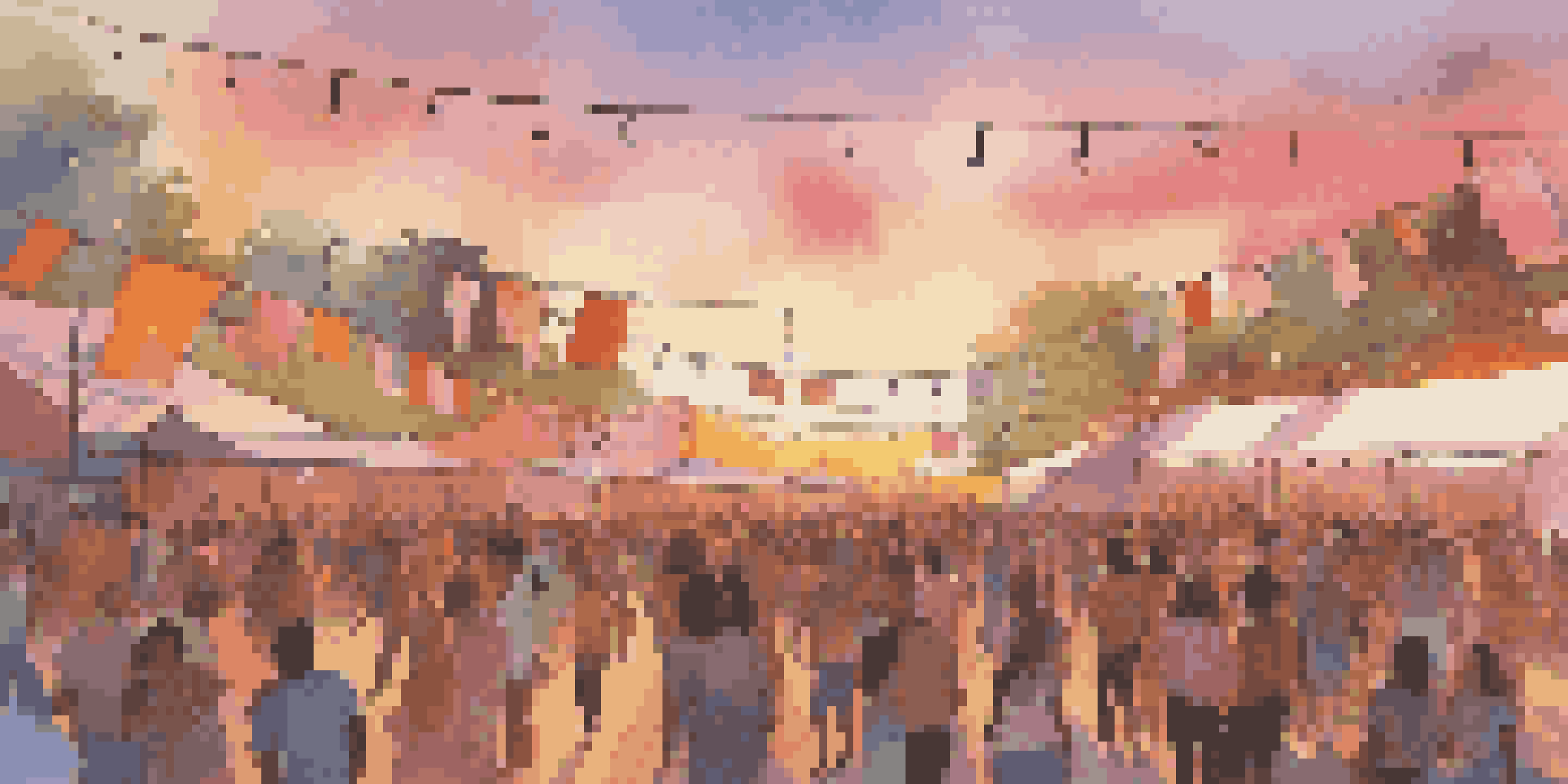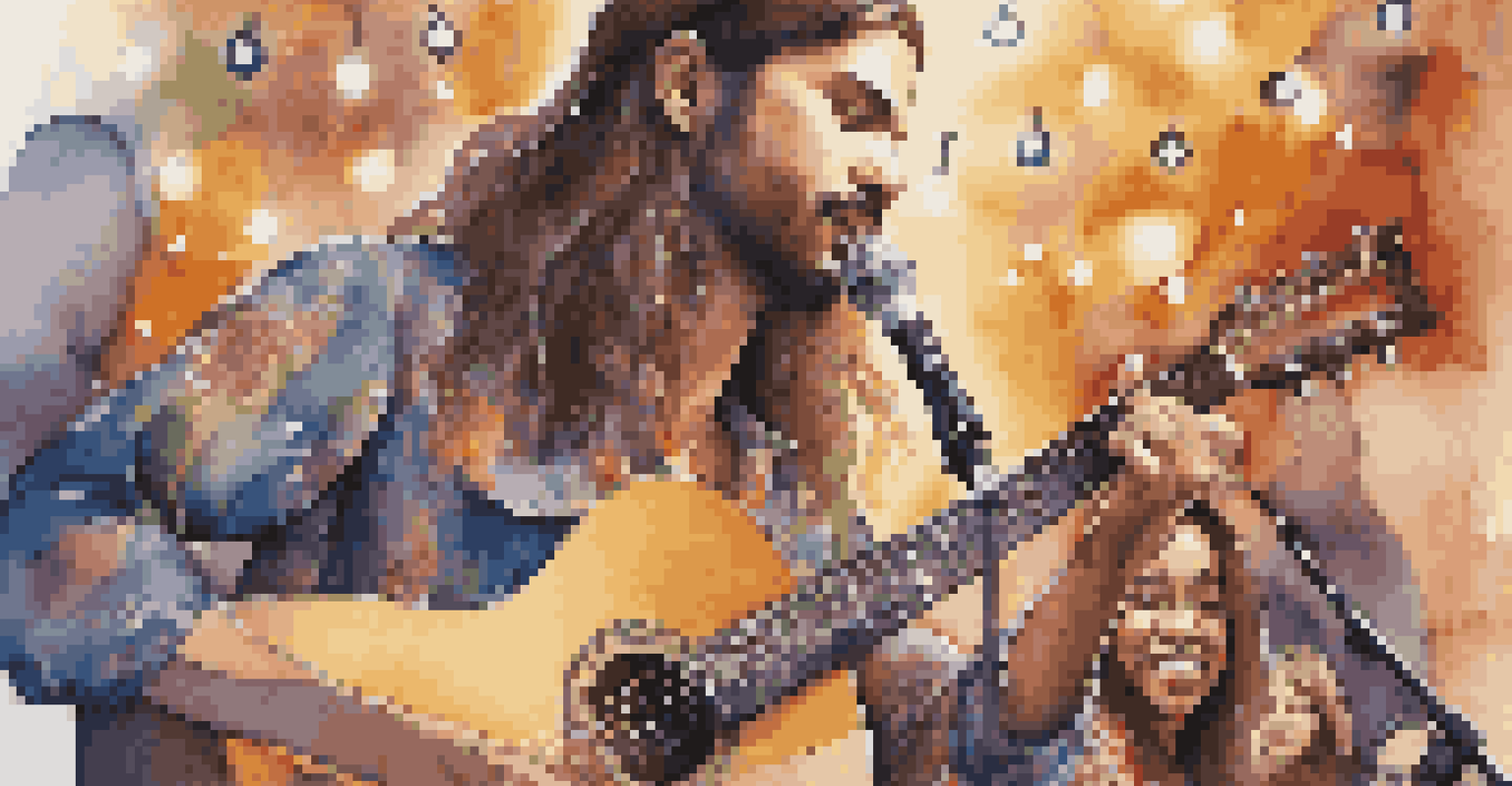Exploring the Intersection of Music and Peace Activism

The Power of Music as a Universal Language
Music has a unique ability to transcend cultural and linguistic barriers, making it a universal language. When people come together to sing or play instruments, they create an emotional connection that often surpasses spoken words. This shared experience can foster understanding and empathy, which are essential components in the pursuit of peace.
Music can change the world because it can change people.
For example, international music festivals often showcase artists from diverse backgrounds, promoting unity and cooperation among attendees. These gatherings don’t just entertain; they send a powerful message that despite our differences, we can come together through music. This collective spirit can inspire listeners to take action for social change and peace.
Furthermore, music can serve as a catalyst for dialogue, encouraging discussions around challenging topics. In times of conflict, songs that promote messages of hope and solidarity can help communities heal and rebuild, proving that music is not just an art form but also a significant tool for social activism.
Historical Roots of Music in Peace Movements
Throughout history, music has played a pivotal role in various peace movements. From the civil rights movement in the United States, where songs like 'We Shall Overcome' became anthems of hope and resilience, to protest songs during the Vietnam War, music has often been at the forefront of social change. These songs encapsulated the frustrations and aspirations of a generation, rallying individuals to join the cause.

The use of music in activism is not limited to any single culture; from Bob Marley’s reggae promoting peace in Jamaica to the folk songs of the 1960s that inspired anti-war protests across the globe, the intersection of music and activism is rich and varied. These artists understood that music could mobilize communities and inspire collective action, creating a sense of belonging among listeners.
By tapping into emotions, these songs often resonate deeply with individuals, serving as a reminder of the power of unity in the face of adversity. Their legacy continues to inspire new generations of artists and activists who seek to use music as a means to advocate for peace.
Modern Artists Using Music for Peace
Today, many contemporary artists harness the power of music to promote peace and social justice. Artists like Billie Eilish and Chance the Rapper use their platforms to raise awareness about mental health, gun violence, and systemic inequality. By weaving messages of hope and change into their lyrics, these musicians encourage their listeners to engage in activism.
The power of music makes all the difference in the world.
Collaborative projects, such as the 'One Love Manchester' benefit concert, showcase how artists can unite for a cause. Following the tragic bombing at the Manchester Arena, musicians from various genres came together to support victims and promote love over hate. This event exemplified how music can be a powerful force for healing and community solidarity.
Moreover, social media has expanded the reach of these artists, enabling them to connect with a global audience. Platforms like Instagram and TikTok allow musicians to share their messages widely, encouraging fans to take part in activism, whether through donations, volunteering, or simply spreading awareness.
Music Festivals as Platforms for Activism
Music festivals have evolved into powerful platforms for activism and peace promotion. Events like Coachella and Glastonbury not only feature diverse musical acts but also incorporate social justice initiatives, encouraging attendees to engage with various causes. Festival-goers can learn about issues like climate change or human rights while enjoying performances, creating a unique blend of entertainment and activism.
These festivals often provide spaces for organizations to set up booths and engage with attendees, fostering conversations about important topics. For instance, a booth promoting mental health awareness at a festival can reach thousands of people, making a significant impact. This integration of music and activism creates an environment where individuals can feel inspired to take action.
Additionally, the vibrant atmosphere of music festivals can amplify the messages of peace and solidarity. When people are in a celebratory mood, they are more likely to embrace and support causes that resonate with them, leading to a ripple effect of activism beyond the festival grounds.
The Role of Lyrics in Advocacy
Lyrics serve as a powerful tool for advocacy in music, often conveying messages of peace and social justice. Many artists choose to write about their personal experiences or the struggles faced by their communities, allowing listeners to empathize and connect with the issues at hand. For example, songs addressing themes like racial injustice or environmental concerns can inspire listeners to reflect on their own roles in creating change.
Moreover, the storytelling aspect of lyrics can bring awareness to lesser-known issues, motivating fans to take action. When listeners hear a song that resonates with their values, they may be more inclined to research the cause, support organizations, or even participate in protests. This narrative approach can lead to a deeper understanding of complex issues.
The impact of powerful lyrics often extends beyond the music itself, seeping into popular culture and sparking conversations. As artists continue to shine a light on societal challenges through their work, they contribute to a broader dialogue about peace and justice.
Collaborative Efforts Between Musicians and Activists
Collaboration between musicians and activists has become increasingly common in the pursuit of social change. Many artists partner with non-profit organizations to raise funds or awareness for various causes, creating campaigns that leverage their music for good. These partnerships often result in powerful initiatives that combine the influence of music with the mission of activism.
For instance, the 'Artists for Peace and Justice' organization unites musicians and artists to support education and healthcare initiatives in impoverished communities. Through concerts, fundraisers, and outreach, they harness the collective power of the arts to make a significant impact. These collaborations not only raise funds but also amplify the voices of those who are often unheard.
By aligning their efforts, musicians and activists can reach a wider audience, inspiring more people to get involved. This synergy between art and activism highlights the importance of community and collaboration in the quest for peace.
The Future of Music in Peace Activism
As we look to the future, the role of music in peace activism is likely to grow even more significant. With the rise of digital platforms, artists have unprecedented opportunities to share their messages and engage with global audiences. This accessibility means that music can continue to be a vital tool for raising awareness and fostering community around social issues.
Moreover, the ongoing challenges we face—such as climate change, inequality, and conflict—will undoubtedly inspire new generations of musicians to use their art for advocacy. The ability to express complex feelings through music allows artists to connect deeply with listeners, motivating them to take action for change.

Ultimately, the intersection of music and peace activism will continue to evolve, driven by the passion and creativity of artists who believe in the power of their craft. As they strum their guitars and pen their lyrics, they remind us that music can heal, unite, and inspire a brighter future for all.